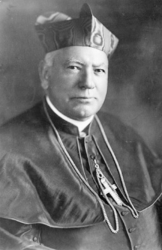Cardinal O’Connell’s presence loomed large in his day
During a 1908 sermon commemorating the centennial of the founding of his beloved Archdiocese of Boston, Cardinal William Henry O’Connell famously stated, “The Puritan has passed; the Catholic remains.”
From one point of view, his statement indicated a turning point in New England history -- the social, cultural, and political events of the time hinted that the steadfast Yankee tradition that had defined the character of New England since exiled English Protestants, or Puritans, set foot on Massachusetts soil in the 1600s, was now losing its grip on the region. In its place, a uniquely Catholic culture had firmly established itself here and had given the Boston area a completely new identity. Boston’s shepherd, accordingly, wanted his flock to feel comfortable in their newly-gained position. By uttering those seven words, he was revealing the strong-willed leader he would become.
“On the one hand, you can read it as a challenge,” said Boston College history professor Thomas O’Connor.
“I think he himself would regard it as a statement of history. He was saying they had their day. Now, the Catholic was in the ascendancy,” he said.
The youngest of 11 children, Cardinal O’Connell was born to Irish immigrants in Lowell in 1859, on the Feast of the Immaculate Conception. Members of his family found work in the mills, but O’Connell knew he was destined for another career. He attended minor seminary in Maryland before graduating from Boston College. Following study at BC, O’Connell went to the Pontifical North American College in Rome for seminary study, and was then ordained a priest.
His parish assignments in the archdiocese were in Medford and Boston’s West End. In 1895, he became rector of the American College, chosen because the Roman Curia was worried the heresy of Americanism had taken root in the school. Church officials saw in Father O’Connell a loyal man committed to “Roman-ness.”
“From the point of view of Rome, it would be important to know what churchmen were on either side,” O’Connor said. “He was loyal to Rome, but on the other hand, he was a proud American. He was a firm believer in the U.S. There was nothing un-American about him.”
With the death of Archbishop Williams in 1907, Rome knew who they wanted to be Boston’s next shepherd.
“I think they felt O’Connell was a sure bet. They could trust him. They could manage him,” O’Connor said. “He understood the Roman way of doing things.”
Cardinal O’Connell was at the helm at a time when Catholics were experiencing unprecedented social mobility, taking places of prominence in society. Just a generation prior, immigrant Catholics from Europe were humble mill workers on the low end of the corporate hierarchy, and the targets of societal prejudice. By this time, Catholics such as John “Honey Fitz” Fitzgerald, grandfather to the first Catholic to be President of the United States, and James Michael Curley had become mayors of Boston, with the latter later becoming a Massachusetts governor.
“The children of immigrants were increasingly assuming professional positions in commerce, law, and the civil service, and O’Connell’s self-assertion as a local leader reflected vicariously on them,” Professor James M. O’Toole writes in “Two Centuries of Faith,” a compilation of essays complied by Boston College to mark the archdiocese’s bicentennial.
If the Puritan had passed, the cardinal was not going to let Catholics forget it -- his influence upon the Catholic conscience would influence society at large.
He frequently, and effectively, spoke out on key issues on legislative agendas at this time. In one instance, he made Catholic candidates reconsider their positions on federal child labor legislation, arguing that the matter gave the government powers that instead should be the purview of the family. He also helped to defeat a measure to bring a lottery to Massachusetts, deriding the lottery as gambling and “regressive taxation.”
In 1942, he was influential in voters’ defeating a referendum to liberalize birth control laws in the state.
He wanted Catholics to be protective of their identity, so he forbade Catholics to enter Protestant churches, and did not allow Catholic women to serve as bridesmaids in non-Catholic weddings. He regarded the Boy Scouts, Girl Scouts and the YMCA as “questionable organizations” and instead encouraged Catholics to join the Catholic Boy or Girl Scouts, or the CYO.
“Generally, the thing he began proposing here is ‘Don’t go copying the Yankee,’” O’Connor said. “His idea clearly was to separate the two for a period of time until the Catholics could become comfortable with their own differences and not defensive about Catholicism.”
His management style also reflected his strong personality. Departing from the leadership style of Archbishop Williams, Cardinal O’Connell preferred a top-down modus operandi, forcing Catholic parishes, schools, hospitals, and other establishments to seek his approval to spend money and for other initiatives.
“He had the reputation in some corners of being a dictator or being heavy-handed,” O’Connor said.
During his tenure, the archdiocese moved its headquarters from Boston to Brighton. He was also supportive of BC’s relocation to nearby Chestnut Hill.
Ironically, the sale of land by the entity which he zealously served to the school he so dearly loved will see the two parties -- the Archdiocese of Boston and Boston College -- working together to force him from the tranquil resting place he willed himself to be interred.



















